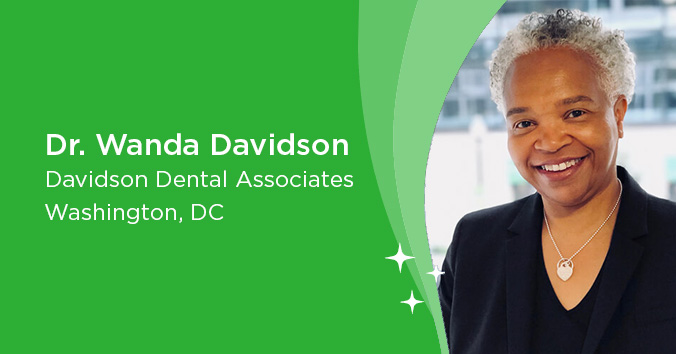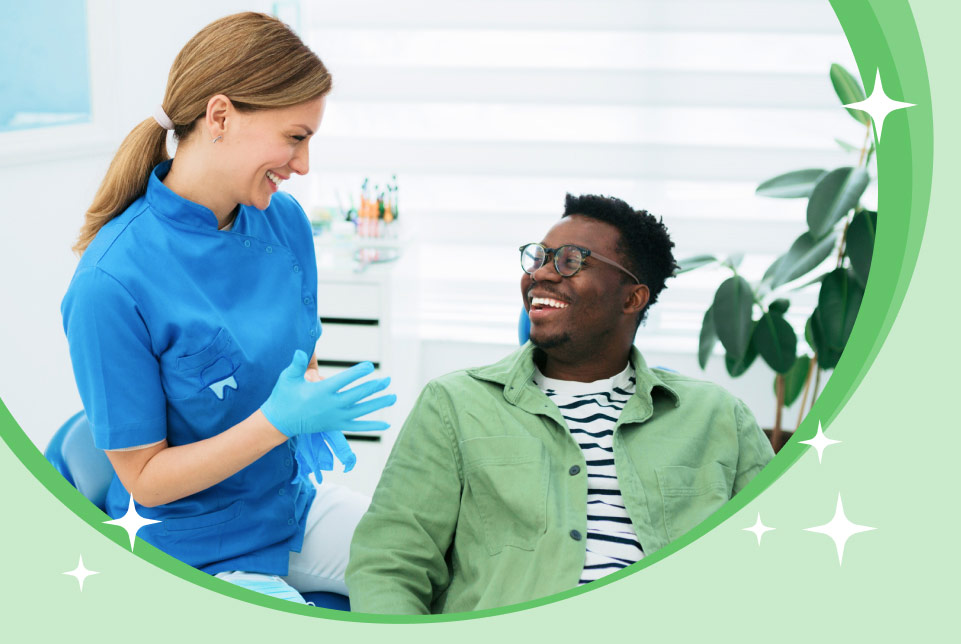
Prosthodontist spotlight: Dr. Wanda Davidson
Dr. Wanda Davidson is always learning. Whether it’s fabricating prostheses or doing home renovations, she is always learning and using her knowledge to make big changes. She’s operated her own group practice, Davidson Dental Associates in Washington, D.C., for 17 years.
After graduating from Tufts University, she received her DDS from the University of Maryland College of Dental Surgery and specialized in Prosthodontics. She has also given back what she has learned, having taught at Howard University’s College of Dentistry, and was twice named Best Clinical Instructor.
Dr. Davidson has a busy schedule, but we found some time to speak with her about her passion for learning — and teaching.
Why did you decide to go into dentistry?
I came from a background of physicians and dentists. My father was a physician, and two of his three brothers were dentists. I had a lot of exposure growing up to these professions, and I knew my future was in one of them. While I loved to see the appreciation and affection that my father’s patients had for him, I suspected that a career in medicine was not for me. Even as a child, when I visited my father’s office, I felt it was a serious and controlled environment, and patients often were sick.
But when I visited my uncles’ dental offices, it was very upbeat and lighthearted. I recall the staff allowing me to move the chairs up and down and letting me mix alginate in rubber bowls. I think that’s where my love affair with dentistry began.
How did you make the jump from general dentistry to prosthodontics?
My mentor, Dr. Samia Elias, was a prosthodontist. She was the only female prosthodontist I had ever met, and she took me under her wing. I was unsure about continuing my education, and she told me to make a list of things I loved to do in my professional life. And through this simple exercise, I realized how much I enjoyed making dentures, crowns and partials for my patients. I realized that helping them transform their smiles, their very facial expressions, truly gave me joy.
I also realized how much I loved making prosthetic devices. In many regards, it’s like being a sculptor or a contractor on a building project. Your work and your artistry can change someone’s life in these powerful and transformative ways because now they can go on a job interview, take wedding photos, or do something as simple as going out to eat with confidence.
It was during a rotation in an emergency clinic that I handled my first implant case, and I realized then that “implant prosthodontics is going to be the wave of the future.” I then made the decision to specialize in prosthodontics. That decision opened doors to incredible experiences like making dentures with a team of students on a Navajo reservation in Arizona. Nearly 30 years have passed since that day, and I still find pleasure and meaning in doing the work I love and serving my community.
What has changed in prosthodontics during that time?
It is a fascinating time to work in this field. When I started practicing about 28 years ago, we were using a rubber base for denture impressions and all these traditional techniques that had been around for decades that are no longer even in use today.
And then halfway through my career, there was something of a technical revolution in dentistry. The digital revolution has had a huge impact on prosthodontics. With digital dentistry, we now have the ability to be more efficient by digitizing the entire process. The technology enhanced the quality and accuracy of the work we do, which translated into vastly better outcomes for patients. The ability to show a patient a digital rendering of their final prosthesis before it is even made is pretty surreal.
Why did you become an instructor?
My teaching experience really started with Dr. Elias, who was both an amazing teacher and prosthodontist, she inspired us and empowered us to approach learning with confidence and competence. As a Black woman in this field, I felt her message strongly. And when I started teaching, I understood how well she taught me. In my own clinical settings, I tried to create the same feeling of confidence in my students.
I started teaching because it was a requirement as a resident and grew to love it. I ended up teaching part time for about six years. It was great working with new dental students and expanding their minds, reminding them that they were capable of mastering the art of dentistry.
That must have been a rewarding experience.
Teaching is amazing. I find that the most amazing and beautiful emails I get are from students who say, “Today, I sat down and did this procedure, and I could almost hear your voice coaching me from behind.” That lets me know you really can make a difference. Because sometimes all it takes is knowing you’ve helped one person along the way. I continue to mentor and support dental students, particularly dental students of color, who often lack the mentorship and professional networks other students often have.
What’s it like to work in a practice that includes both generalists and specialists?
It’s fantastic because I’m always learning. I have colleagues that I can refer patients to and collaborate with. We can treat patients at a high level because everybody brings their own expertise to the patient-dentist relationship. I’ve created a world where it’s almost like an academic institution.
It’s a group practice, but we also operate as a family. I’ve had the same dental assistant and hygienist for the past 22 years. We’re like three sisters who are an amazing team. And because of that, it means the care we give our patients is really very holistic: we treat the whole person. When you care about the person’s children and their spouse, and whether their job is working out, you’re not just treating the patients dentally but the entire person. And that’s what patients really appreciate and are drawn to.
What would you say to a recent dental school graduate?
My great-great-grandfather was an emancipated slave from Davidson County, North Carolina. My grandfather made sure his four sons and two daughters all completed their doctorate degrees. He instilled that in his children, and then it was passed down generationally. For the recent graduate, your education is something no one can take from you; it’s something you have earned. It can lead you to amazing places.
So, my best advice to anyone is to never stop learning. Continue to grow, the opportunities are endless. Invest in yourself by taking courses and keep company with people who are like minded and will help elevate you.
What do you do when you’re not practicing prosthodontics?
I love to garden and do home renovations. HGTV stays on in my house, and I realized that goes hand in hand with my prosthodontics — they’re both about taking things that are broken and restoring them back to a new condition. The pandemic has made clear that life is precious and has to be enjoyed. The goal is to do what you love and enjoy the journey along the way.
Congratulations to Dr. Wanda Davidson on being named our Dental Health Partner of the Month! Thank you for taking the time to share your thoughts with us. You can find out more about Dr. Davidson and her practice by visiting her office’s website and Facebook page.
Recent posts
- Delta Dental is partnering with dental schools to offer exclusive CE courses
- Drive better patient experiences with benefit conversations
- Offer care beyond the chair with teledentistry
- Healthy mouths begin with hygienists
- How to educate patients and make them partners in oral health
- Dr. Justin Perdichizzi — serving those who served
- Get your patients to make (and keep) their dental appointments
- One sign-on, many advantages
- Delta Dental hosts in-person Provider Advisory Council in Arizona
- Tooth be told, we love our dentists
